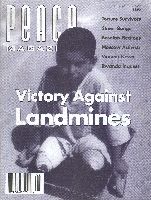
Peace Magazine Nov-Dec 1997, page 11. Some rights reserved.
Search for other articles by Asad Ismi here
AS THE New Statesman recently put it, "[Britain] should have apologized for the Opium Wars" when it handed back Hong Kong to China in July. Not surprisingly, this episode of sordid imperial aggression was not mentioned by British representatives. Hong Kong was ceded by China to Britain in 1842 as part of the settlement for the First Opium War (1839-1842). Determined to turn China into a market for Indian opium (a major source of British imperial revenue), Britain sent six warships and 7,000 troops that captured Canton (now Shanghai) in 1839. This was in response to the Chinese emperor's prohibition on opium imports. For the next two years, the British expedition sacked China's main coastal cities until the Chinese gave up Hong Kong and opened five new ports to foreign trade.
Not content with this level of access to China, Britain followed with the Second Opium War (1856-1858) during which Anglo-French forces occupied both Canton and Tientsin. China agreed to open up the country to free foreign trade and legalize opium imports as urged by the British. By now, Western powers, led by Britain and France, "enjoyed quasi-colonial status" within China's five major cities. Following opium's legalization, "China achieved a level of mass addiction never equaled by any nation before or since." By 1900, 13.5 million Chinese addicts (out of a population of 400 million) consumed 39,000 tons of opium annually; six years later 27% of all adult Chinese men had become opium smokers.
Forcibly turning China into a vast drug market ensured prosperity for the British colonial rulers in India. In 1773, Warren Hastings, Governor-General of Bengal, had established a monopoly on the sale of opium which became India's main export. The British transformed opium "from luxury good to bulk commodity". Opium sales solved the money shortage resulting from the conquest of Bengal and made up 6 to 15% of British India's tax revenues during the 1800s. Most crucially, Britain used opium exports to control the profitable triangular trade with India and China: Indian opium was bartered for Chinese tea taken to Britain and British textiles and machinery were brought back to India.
While the British elite prospered, China stagnated under the burdens of foreign domination, opium addiction and related official corruption, a situation which continued on the mainland until the Communist victory over Chiang Kai-shek's Nationalists. The India-China opium trade ended in 1919 but by then China's opium production was enough to fulfill domestic demand. In the 1920s, drug cartels became closely allied to the Chiang Kai-shek government, which used them to crush Communist labour unions. For this service, Chiang made Tu Yueh-sheng (China's "Opium King"), a major general in the Nationalist army (Kuomintang, KMT). Tu soon became one of Shanghai's "most respected citizens."
After the victory of Mao Tse-tung's forces in 1949, the Chinese drug cartels left en masse for Hong Kong. With their arrival, British authorities once again started to benefit from the drug trade. By the 1970s, corrupt British and Chinese police officers in Hong Kong were working closely with the drug cartels "to regulate the colony's heroin traffic, taking a major share of the profits and using the law to crush any competition." Such corruption was pervasive and one officer who resigned had invested several million dollars in restaurants, real estate, apartment buildings and gambling houses.
With this official encouragement, Hong Kong became "Asia's heroin laboratory ... at the end of the opium trail from Southeast Asia and the beginning of a heroin pipeline to the United States." Almost all of Hong Kong's opium came from Thailand. By 1972, the British colony had become a major supplier of heroin to the U.S. market, and remains so today.
As the hand-over of Hong Kong neared, there was much concern on the British side about the preservation of "democracy" in the territory. However, as one observer stated, "colonies are the antithesis of democracy." For 150 years Hong Kong was ruled by a British dictatorship. Chris Patten, like the preceding 27 governors, was appointed by London, not elected by the people of Hong Kong. Only when Chinese rule had been agreed upon in 1992 did Patten introduce "a limited extension of the franchise", clearly to create problems for China.
Far from ending democracy, Britain's departure from Hong Kong brings to a close the loathsome legacy of British drug trafficking in Asia.
Asad Ismi is a Research Associate at Canada-Americas Policy Alternatives (CAPA) and holds a Ph.D. in war studies from the University of London.
Frederic Dannen, "Partners in Crime", The New Republic, July 14, 21, 1997.
Martin Jacques, "Never Apologise", New Statesman, July 11, 1997.
Alfred McCoy, The Politics of Heroin: CIA complicity in the global drug trade, New York, Lawrence Hill, 1991.

Peace Magazine Nov-Dec 1997, page 11. Some rights reserved.
Search for other articles by Asad Ismi here